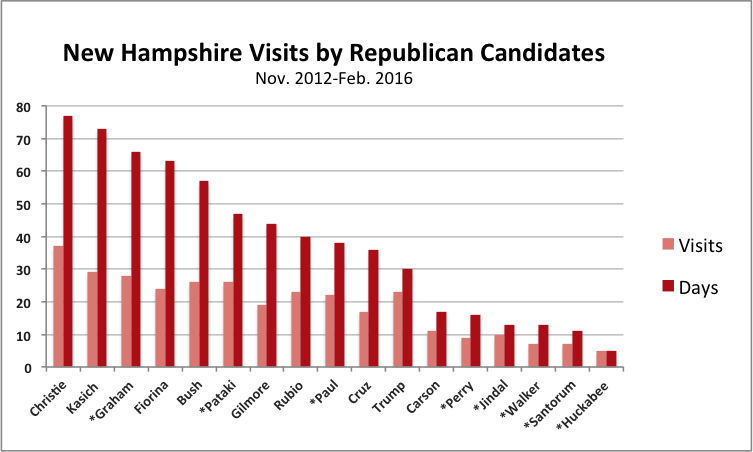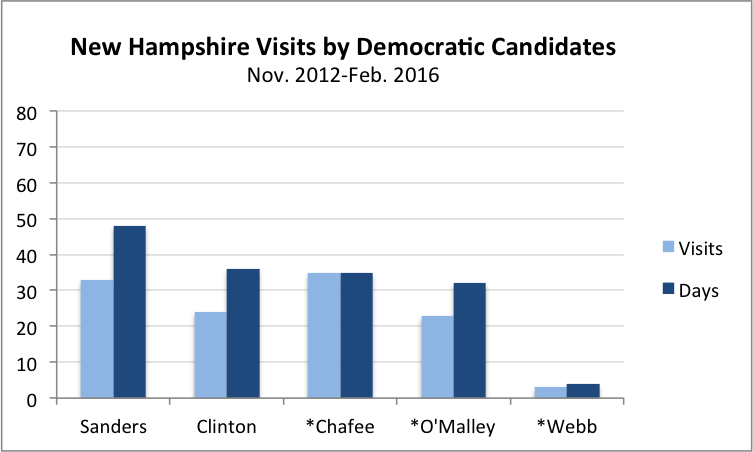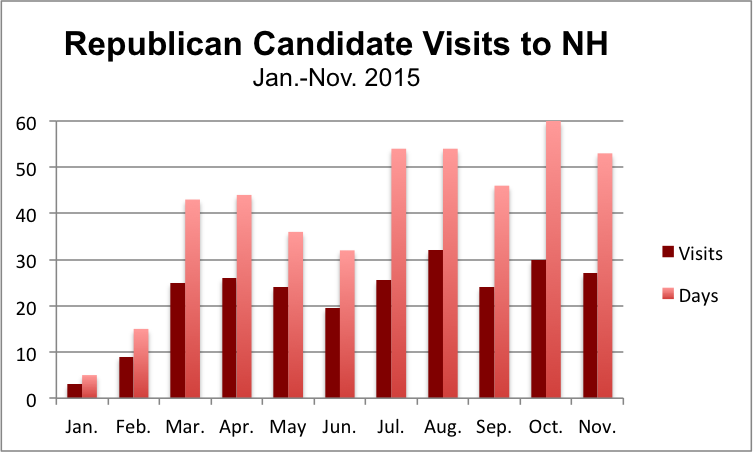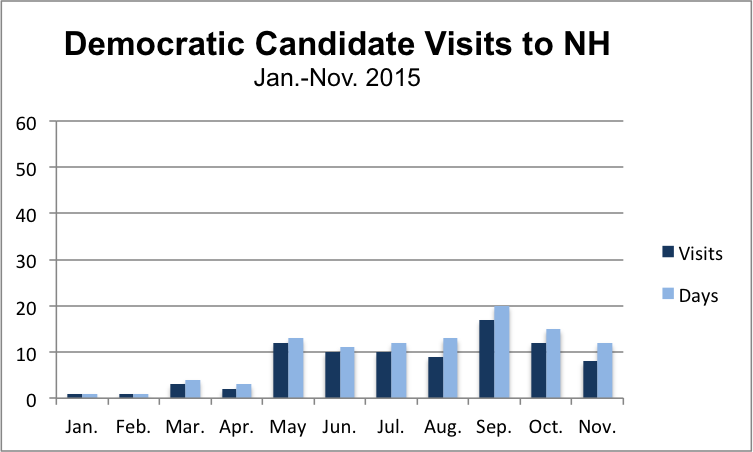"Granite Staters are tough but fair with those who would be President. Toward the end of the race, when the temperature gets colder and the campaigning gets hotter, it takes dedication to survive. Here is democracy at its best, for it takes more than a big bankroll or name recognition to impress us." --Nackey Loeb
First-in-the-Nation
| State of
New Hampshire
Revised Statutes, TITLE LXIII, Chapter 653 +
653:9 Presidential Primary Election. – The presidential primary election shall be held on the second Tuesday in March or on a Tuesday selected by the secretary of state which is 7 days or more immediately preceding the date on which any other state shall hold a similar election, whichever is earlier, of each year when a president of the United States is to be elected or the year previous... |
The premise and the promise of New Hampshire's first
in the nation primary
is that it allows even little-known, underfunded candidates to have a
chance at winning the White House. By engaging in grassroots
politics,
visiting ordinary citizens in their living rooms and meeting them in
diners, a
candidate can gain favorable notice, attract support of activists, do
well in the
primary, and thereby gain momentum going into the rest of the
nominating process. Secretary of State Bill Gardner points out
that not only do New Hampshire citizens have great opportunities to
learn about the candidates, but the candidates themselves learn a lot
by going through the process (+).
Critics
argue
that
New
Hampshire
is
not
representative
and
should
not
be
granted
a
privileged
position,
but
the
state
has
repeatedly
fended
off
challenges
to
its
first-in-the-nation
status.
New Hampshire has a strong grassroots democratic tradition.
The
General
Court, New
Hampshire's "citizen legislature," consists of the 400-member House and
24-member
Senate. The House is the largest state legislative body in the
United States. (Legislators
receive a salary of $200 per biennium). Many citizens also serve
in local government or at least have the experience of participating in
the local town hall meetings.
Each cycle there are a few candidates who choose to focus on the New Hampshire primary over the Iowa caucuses, viewing it as providing a "level playing field" which does not require as much resources as Iowa and the caucus system. Social conservatives have less sway here than in Iowa. Additionally, because it is relatively easy to get on the New Hampshire presidential primary ballot, many lesser known or fringe candidates run, adding color to the spectacle.
Over the decades, the New Hampshire primary has produced many
memorable scenes, and each succeeding primary reinforces
the proud tradition. The primary and all the comings and goings
also
provide a tremendous economic boost to the state.
The large Republican field meant the Granite State saw
much more
Republican traffic than Democratic traffic. All told, from the
first vist by Gov. Bobby Jindal in May 2013 to Primary Day Feb. 9,
2016, 17 major Republican
candidates made 326 visits totaling 646 days;
when one includes seven others who were mentioned as prospects the
tally rises to 354 visits totaling 681 days. By contrast, from
Gov. Martin O'Malley's first visit in Nov. 2013 to Feb. 2016, six major Democratic candidates
made 117 visits totaling 154 days; or if one includes three
others who were mentioned as prospects the tally rises to 123 visits
totaling 16 days. (Taking just those prospects who actually
declared, this computes to 3.02 times as many visits and 4.19 times as
many days).
Among the major issues were national security, in the
wake of the Paris and San Bernadino attacks, the cost of college
education, and New Hampshire's opiod crisis.

On the Republican side, the cast of
characters was quite different in New Hampshire than in
Iowa. Gov. Chris Christie, Gov. John Kasich, Gov.
Jeb Bush, Sen. Lindsey Graham, former Gov. George Pataki, and
former Gov. Jim Gilmore went "all in" in New Hampshire, while former
Gov. Mike Huckabee, then-Gov. Bobby Jindal and former Sen. Rick
Santorum were largely absent. (Graham and Pataki ended their
campaigns before the primary). Christie spent the most time in
state (77 days) followed by Kasich (73 days), Graham (66 days) and
Fiorina (63 days). Trump did not do extended visits and eschewed
the typical retail stops, instead popping in for large rallies.
In the homestretch final week, nine
major candidates campaigned in the state.

On the Democratic side, former Sec. of State Hillary Clinton started
with a large campaign organization and by September she gained
endorsements of many top officials including Gov. Hassan, Sen. Shaheen
and Rep. Kuster. Sen. Bernie Sanders started later here than in
Iowa, but built up a sizable campaign organization. He may have
benefited somewhat because he hails from neighboring Vermont.
Former Gov. Martin O'Malley tried to gain
traction, but withdrew following the Feb. 1, 2016 Iowa cacuces.
Former Gov. Lincoln Chafee made a total of 32 visits,
all trips in and out on the same day, before ending his bid on Oct. 23,
2015.
Early Groundwork (Pre-Campaign
Period, 2013-14)
Potential Republican and Democratic presidential
candidates made over 60 trips
to the Granite
State during the 2013-14 cycle. In addition to helping local
party committees and candidates, they used these visits to connect with
activists and potential
supporters. The first visit of the 2016 cycle came on May 10,
2013
from Gov. Bobby Jindal (R-LA).
New Hampshire is fairly evenly
split politically (registration as of Nov. 4, 2014 was 239,692
Democrats, 272,300 Republicans, and 384,837 Undeclared for a total of
896,829). High-profile contests included the U.S. Senate race and
both U.S. House races. A total of 495,453 votes were counted in
the Nov. 4 general election.
• Gov. Maggie Hassan (D) defeated Walt
Havenstein (R) by 52.4% to 47.4% to win a second term..
• U.S. Sen. Jeanne Shaheen (D) defeatedt
former Mass. U.S. Sen. Scott Brown (R) by 51.5% to 48.2%.
• Both U.S. House seats were competitive. In the 1st CD, which
includes Manchester, former U.S. Rep. Frank Guinta (R) won a rematch
with U.S. Rep. Carol Shea-Porter by 51.7% to 48.1%. In the 2nd
CD, which
includes
Nashua, Concord and the
whole western and northern part of the state, U.S. Rep. Ann McLane
Kuster (D) defeated state Rep.
Marilinda Garcia (R) by 55.0% to 45.0%.
• In the state Senate all 24 seats were up. Republicans gained
seats taking the balance from 12 Republicans, 11 Democrats and 1
vacancy to 14 Republicans, 10 Democrats (+).
• Republicans gained control in the House of Representatives, where
all 400 seats were up. The balance shifted from 212
Democrats, 172 Republicans and 16 vacancies to 239 Republicans, 169
Democrats and 1 other (+).
Potential presidential candidates helped out in these races as
well as with party events. There was more than twice as much
activity by potential Republican candidates because of the larger pool
of prospects. The most frequent potential candidate to visit was
U.S. Rep. Peter
King, who made a total of eight visits in 2013-14, but whose interest
seemed to wane in the latter half of 2014. Gov. Christie, came in
next with five visits followed by Sens. Paul and Cruz and Gov. Jindal
at four. There were a few early talent signings. In
July 2014 Sen. Rand Paul's RAND PAC announced Mike Biundo as New
England chief strategist, and veteran operative Mike Dennehy
advised Gov. Rick Perry. On the Democratic side, Gov. Martin
O'Malley's O'PAC paid for staff to help out Democrats in the early
states, including New Hampshire. Also of note, the independent
Ready for Hillary super PAC started its organizing in the state with
meetings on Jan. 7, 2014, announced NH operative Sean Downey as its
Northeast regional organizing director in April, and had volunteers
signing up supporters at fairs, parades, festivals and
fundraisers.
This Time No Drama Over the Date
New Hampshire's first status is enshrined
in state law, and
New Hampshire Secretary of State Bill Gardner has demonstrated time and
again he
will not budge when it comes to protecting the first
status, including the seven-day cushion. In the 2012 cycle
Gardner even threatened to hold the primary in December 2011. (In
an Oct, 12, 2011
statement,
Gardner wrote that, "The dates of Tuesday, December
13th, and Tuesday, December 6th are realistic options, and we have
logistics in place to make either date happen if needed.") Not
until
Nov.
2, 2011 did
Gardner
announce
the date of the primary as
Jan. 10, 2012. In 2007 Gardner's announcement came even later; on
Nov. 21, 2007 he announced the date as Jan. 8, 2008 (+).
While
DNC
rules
specify
Feb.
9,
2016
as
the
date
of
the
New
Hampshire
primary,
state
law
trumps
party
rules.
Based
on
past
history
there
was
a
fair
chance
that
the
primary
would
not
occur
on
February
9.
However
this
time,
the
national
party
committees
showed
a
determination
to
hold
the
line
this
cycle
and
no
states
threatened
New
Hampshire's position. Gardner attracted
little notice on Dec. 17, 2015 when he made the Feb. 9, 2016 date
official.
Changes in the Media Environment
Presidential hopefuls encountered a media environment
that has changed
from recent cycles. Most notably, Bill Binnie, who sought the
Republican nomination for U.S. Senate in 2010, has revamped
WBIN-TV.
Binnie Media's NH1 News launched on Sept. 15, 2014. Based in
Concord,
NH1 encompasses television and radio, and has a staff of more than one
hundred, including such talent as veteran statehouse reporter Kevin
Landrigan, formerly of the Nashua Telegraph,
and
Paul
Steinhauser
of
CNN
(+).
Binnie's
venture
generated
a
bit
of
competition
with
WMUR-TV,
which
has
dominated
the
New
Hampshire
market
at
least
since
the
1990s.
Veteran
political
reporter
John
DiStaso,
who
worked
at
the
Union
Leader for 34 years and wrote the "Granite
Status"
column,
moved to New Hampshire Journal
in March 2014, where
he
wrote "Granite
Reports" for a year; he then joined WMUR's politics team
effective April 6, 2015.
Additionally,
James
Pindell
moved
from
WMUR-TV
to
the
Boston
Globe following the 2014 midterms.
With 10 counties and a
population of
1.3 million, New Hampshire is a bit easier to travel around in than
Iowa, although getting up to Coos County in the far north requires a
bit of a trek. As in Iowa, candidates must put in time speaking
to
groups in living
rooms and small businesses around the state. Their campaigns
work to build a team of committed county chairs and precinct captains
and obtain endorsements from state
and local officials. Campaign headquarters open in Manchester or
Concord. During the summer the candidates step up their visits.


In the fall the leaves turn, and the candidates
continue to
visit. The ad campaign gears up. Debates
provide an opportunity for the candidates' supporters to engage in sign
wars.
On Sept. 30, 2015 Secretary of State Gardner set the filing period for the presidential primary for Nov. 4-Nov. 20, 2015. Most of the major candidates made the visit to the Secretary of State's office in the Capitol, where surrounded by reporters, they sat at a historic desk, presented their $1,000 checks and put their name to paper. Fifty eight candidates qualified to appear on the ballot (30 Republicans and 28 Democrats). By comparision in both 2007 (>) and 2011 (>) a total of 44 candidates filed to appear on the ballot as presidential candidates.
Temperatures fall, and still the candidates continue
their
visits. Citizens receive numerous calls from campaigns trying to
identify and mobilize supporters, their mailboxes are flooded with
campaign mailers, and TV ads fill the airwaves. After the Caucus
Night celebrations in Iowa, most of the
remaining candidates headed immediately to New Hampshire for a final
week
of campaigning. Elm Street in Manchester becomes a bit of a zoo,
crowded with supporters of the candidates, representatives of various
interest groups trying to get their messages out,
media and political tourists; at the center of it all is the Radisson
Hotel.
Independents Form an Important Voting Bloc
Undeclared voters can vote in either party's
primary. The procedure is simple. Upon entering the polling
place, a voter declares for one of the parties and votes on that
party's ballot; after voting he or she can return to the undeclared
status. As noted above, undeclared or independent voters form a
significant
voting group.
Beginning with the counting of the votes in tiny
Dixville Notch and
Hart's Location, results trickle in on primary night. Supporters
of
the various candidates gather, usually in the Manchester area, to watch
and see who will be able to claim the boost coming out of
New Hampshire.
Republicans
Donald Trump led the New Hampshire polls throughout his campaign, but
after he finished second in the Iowa caucuses, there were questions
about whether he would underperform in New Hampshire. Trump's
resounding win answered the skeptics; he more than doubled the vote
total of second place finisher Gov. John Kasich and gained the second
most votes ever in a New Hampshire Republican primary. Cruz, Bush
and Rubio finished closely bunched up in third, fourth and fifth.
Disappointing results ended the campaigns of Christie and Fiorina.
In the last six New Hampshire Republican primaries,
five were
competitive. The first-place finisher has gone on to win the
nomination three times (former Gov. Mitt Romney in 2012, Sen. John
McCain in 2008, and President George H.W. Bush fending off Pat Buchanan
in 1992). The second-place finisher ended up winning the
nomination twice (Gov. George W. Bush in 2000, after finishing second
to McCain, and Sen. Bob Dole in 1996 after finishing second to
Buchanan).
| Feb. 9, 2016 |
Trump 100,639 (35.6%), Kasich 44,878 (15.9%), Cruz 33,214 (11.7%), Bush 31,341 (11.1%), Rubio 29,991 (10.6%)...> | 282,804 |
| Jan. 10, 2012 | Romney 97,591 (39.2%), Paul 56,872 (22.9%), Huntsman 41,964 (16.9%), Santorum 23,432 (9.4%), Gingrich 23,421 (9.4%), Others 3,195 (1.3%). | 248,475 |
| Jan. 8, 2008 |
McCain 88,713
(37.0%),
Romney 75,675 (31.6%), Huckabee 26,916 (11.2%)... |
239,758 |
| Jan.
27,
2004 |
Bush 53,962 (79.8%), Others 13,662 (20.2%). | 67,624 |
| Feb. 1, 2000 |
McCain 115,606 (48.5%), Bush 72,330 (30.3%), Forbes 30,166 (12.6%)... | 238,606 |
| Feb. 20, 1996 |
Buchanan 56,874
(27.3%),
Dole 54,738 (26.2%), Alexander 47,148 (22.6%)... |
208,740 |
| Feb. 18, 1992 |
Bush 92,271
(53.2%), Buchanan
65,106 (37.6%), Others 16,037 (9.2%). |
173,414 |
Democrats
As Primary Day arrived, the expectation was the Sen. Bernie Sanders
would win, and the question was by how much. Sanders gained the
most votes ever in a Democratic presidential primary. His margin
of more than 20 percentage points dealt a setback to former Secretary
of State Hillary Clinton, who had won here in 2008.
In the last six New Hampshire Democratic primaries,
three were
competitive. In 2000 Vice President Gore won the primary and went
on to win the nomination. In 2008, Sen. Hillary Clinton bounced
back from Iowa, but it was the second place finisher Sen. Barack Obama
who went on to win the nomination. In 2000, Gov. Bill Clinton
finished second to Sen. Paul Tsongas but declared himself the "comeback
kid" and went on to win the nomination.
| Feb. 9, 2016 | Sanders 151,954
(61.0%), Clinton 95,226 (38.2%)...> |
249,215 |
| Jan. 10, 2012 | Obama 49,080 (82.0%), Others 10,792 (18.0%). | 59,872 |
| Jan. 8, 2008 |
Clinton 112,404
(39.1%), Obama 104,815 (36.5%), Edwards 48,699
(16.9%)... |
287,557 |
| Jan.
27,
2004 |
Kerry 84,377 (38.4%), Dean 57,761 (26.3%), Clark 27,314 (12.4%)... | 219,787 |
| Feb. 1, 2000 |
Gore 76,897 (49.7%), Bradley 70,502 (45.6%), Others 7,238 (4.7%). | 154,637 |
| Feb. 20, 1996 |
Clinton 76,797
(84.4%), Others 14,230 (15.6%). |
91,027 |
| Feb. 18, 1992 |
Tsongas 55,663
(33.2%), Clinton 41,540
(24.8%), Kerrey 18,584 (11.1%)... |
167,664 |
Note:
DNC and RNC rules
have different language covering the timing of the early
primaries.
DNC rules specify specific dates for the four
early states, including Feb. 9, 2016 for New Hampshire, while
RNC rules have a general carve-out period that
covers the four early states.
However, state law, cited above, trumps the
rules. If
other states move up their primary dates and encroach on the window,
Secretary of State Bill Gardner will move its date forward.
DNC Rule 11 - "...Provided, however, that the
Iowa
precinct caucuses may be held no earlier than 29 days before the first
Tuesday in March; that the New Hampshire primary may be held no earlier
than 21 days before the first Tuesday in March; that the Nevada
first-tier caucuses may be held no earlier than 10 days before the
first Tuesday in March; and that the South Carolina primary may be held
no earlier than 3 days before the first Tuesday in March..."
RNC Rule 16 (4) (c) (1) - "No primary, caucus, convention, or other process to elect, select, allocate, or bind delegates to the national convention shall occur prior to March 1 or after the second Saturday in June in the year in which a national convention is held. Except Iowa, New Hampshire, South Carolina, and Nevada may conduct their processes no earlier than one month before the next earliest state in the year in which a national convention is held and shall not be subject to the provisions of paragraph (c)(2) of this rule."
Resources
Fergus Cullen. Nov. 1, 2015. GRANITE STEPS: Stumbles, Surprises, and Successes on the New Hampshire Primary Trail. Union Leader Corporation. (working title was "Carved by Granite: The First-in-the-Nation New Hampshire Presidential Primary, 1992-2012.") >
David W. Moore and Andrew E. Smith. Fall 2015. THE FIRST PRIMARY: New Hampshire's
Outsize Role in Presidential Nominations. Lebanon, NH: University of New Hampshire
Press.
In The First Primary,
Moore and Smith offer a comprehensive history of the state’s primary,
an analysis of its media coverage and impact, and a description of the
New Hampshire electorate, along with a discussion of how that
electorate reflects or diverges from national opinions on candidates
and issues. (working title
was "Out of the Gate: The New Hampshire Primary in the Political
Process)
Dante Scala. Dec.
2003. STORMY WEATHER:
The New Hampshire Primary and Presidential Politics. New
York: Palgrave
MacMillan.
"Scala explains the importance and
peculiarities of New Hampshire,
providing both historical context and insights, based on extensive
interviews, into the tensions between local politics and the national
agendas of candidates. New Hampshire's sympathy for reformist
candidates has the paradoxical effect of jumpstarting the campaigns of
those candidates least representative of voters nationally, and Scala
explores the tremendous implications for presidential politics. Scala
explains what it takes for candidates to make the Granite State a
launching pad rather than a crash landing."
Will Rabbe, Aram Fischer and Mark Lynch. WINNING NEW HAMPSHIRE: A Portrait
of the 2004 Democratic Primary. >
"The film captures the essence of
the New
Hampshire Primary, what it takes to win, the effects of the media and
the new political youth movement. With a focus on the John Kerry
Campaign, the winner of both the New Hampshire Primary and the
Democratic Nomination, Winning New Hampshire provides
an
experience
of
this
extraordinary
political
event
and
presents
a
distinctly
new
perspective
of
the
Presidential
selection
process."
Meryl Levin and Will Kanteres. June
2004. PRIMARILY
NEW HAMPSHIRE. Third Rail Press, Inc.
"...celebrates the young
politicos who dedicated a year of their lives to working on the
Presidential Primary in New Hampshire during the 2004 campaign season."
and...
University of New
Hampshire - Dante Scala and Andy Smith. FIRST! Understanding New
Hampshire's Presidential
Primary
MOOC. Course went live in Oct. 2015.
"This free online
course will investigate the primary with
an eye
towards both the past and present. You'll learn about the history of
the presidential nomination process, the role New Hampshire plays in
the media's coverage of elections and how the state is often a proving
ground for unknown candidates and fledging political operatives.
Through a combination of video lectures, interactive activities and
online discussions, we will explore the unique qualities of the
First-in-the-Nation presidential primary and its impact on how the
United States picks its presidents."
American University School of
Communication. 2008 New Hampshire Primary Short Documentaries >
"American University School of
Communication students spent five
whirlwind days producing great work in New Hampshire for Special Topics
in News Media: Covering the 2008 Presidential Election, a new course."

